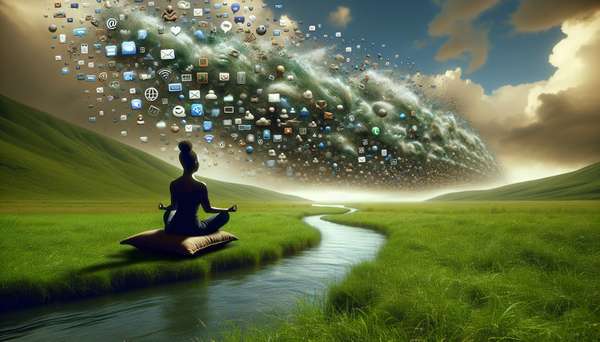SDC Rewards Member
Upgrade yours now
Digital Detox: The Foolish Fantasy of 'Unplugging' in a Plugged-In World
In the grand tapestry of modern fads, there lies a particularly amusing thread that the young folk have been touting as the cure-all for our tech-addled brains: the "Digital Detox." The premise is as simple as it is laughable – to voluntarily abstain from all forms of digital technology for a period, as if one were fasting from gadgets instead of grub. It's the equivalent of a diet that promises you'll lose weight by merely avoiding mirrors – out of sight, out of mind, and out of touch, if you ask me.
Now, proponents of this digital abstinence swear by its supposed benefits: improved concentration, better sleep, and a reconnection with the "real" world. They paint a picture of a serene escape from the cacophony of constant notifications, the blue glow of screens, and the relentless pressure to be perpetually online. But let's not kid ourselves; in a world where your toaster has a Twitter account, the idea of unplugging is about as practical as using a typewriter to send a text message.

The illusion of peace: One breath away from the tidal wave of digital notifications.
Let's dissect this folly, shall we? The modern world is a web of interconnectedness, with digital tendrils reaching into every aspect of our lives. To unplug is to become an island in a sea of information. Sure, you might find temporary solace in your self-imposed exile, but at what cost? Missed calls from your grandchildren, unanswered emails from old friends, and the latest news passing you by like ships in the night.
And what of the aftermath? Once you've returned from your digital sabbatical, you'll be greeted by an avalanche of the very thing you sought to escape. Your inbox will be a battleground, your social media a minefield of notifications. It's akin to holding your breath to enjoy the silence, only to be winded by the inevitable gasp for air.
Moreover, this notion of "unplugging" reeks of a certain privilege, suggesting that one can simply opt-out of the digital dialogue without consequence. For many, the online world is not a leisurely distraction but a lifeline – a means of work, communication, and participation in society. To suggest we can all afford to disconnect is to ignore the reality of our interconnected existence.
And let's not forget the irony of the digital detox retreats – yes, they exist – where for a modest fee, you can be whisked away to a place where Wi-Fi is a dirty word, only to have your 'authentic' experience documented by the very devices you've sworn off. It's the diet pill of the tech world; a quick fix that promises much but delivers little.
In conclusion, while the allure of a digital detox might seem like a beacon of hope in our screen-saturated lives, it's little more than a mirage. The truth is, we can't simply unplug from the digital world any more than we can unplug from the society itself. Instead of indulging in this foolish fantasy, we'd be better served learning to navigate the digital waves rather than pretending we can live in a bubble untouched by the tides of technology.
So, dear readers, let us not be lured by the siren song of the digital detox. Embrace the tools of the modern age, but do so with moderation and mindfulness. After all, the key to a balanced life is not found in turning off, but in tuning in wisely.
Until next time, stay cranky, and stay connected.
Last edited by a moderator:





